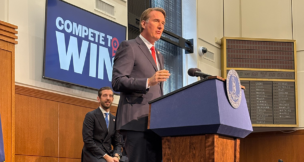
Kate Andrews. Photo by James Lee

Kate Andrews. Photo by James Lee
On pins and needles
Kate Andrews //November 29, 2024//
If you’re one of the 140,000 federal workers living in Virginia, you might be updating your résumé or thinking about whether you want to relocate to a different state.
In his campaign platform, President-elect Donald Trump vowed to move as many as 100,000 civilian federal jobs to states outside the Washington, D.C., region, as well as strip civil service protections from 50,000 career government workers. The Department of Education could be gone, and federal workers have voiced strong concerns over their jobs in national media.
Trump’s repeated rhetoric aimed at so-called “rogue bureaucrats” — the federal workers he claims thwarted his agenda in his first term — indicates how serious the stakes are for civil servants as he lays the groundwork for his second term.
In November, Trump tapped Elon Musk and Vivek Ramaswamy to lead a new Department of Government Efficiency (or DOGE, a nod to “first buddy” Musk’s favorite cryptocurrency). The duo are charged with bringing about “drastic” cuts to federal government by America’s 250th anniversary on July 4, 2026. For his part, Musk has said he aims to cut $2 trillion, or about a third, from the federal budget. Ramaswamy, who has called for the immediate elimination of the Department of Education, the IRS and the FBI, favors cutting federal personnel by 75% via mass layoffs.
Two days after the election, U.S. Sen. Mark Warner cautioned that Trump’s federal workforce plans would hurt Virginia “worse than any other state.” Beyond federal employees who live and spend money in Northern Virginia, if Trump “takes an axe” to cut government programs that impact technology and national security, Hampton Roads would also suffer economic fallout, Warner says.
U.S. Sen. Tim Kaine and Warner, along with U.S. House Rep. Gerry Connolly, D-Fairfax County, have co-sponsored legislation to oppose Trump’s re-enactment of Schedule F, which would take away civil protections for some federal workers, leaving them more vulnerable to firing.
Outside the government, too, the mood is shifting.
Before the election, an organization financially backed by the conservative Heritage Foundation started the “DHS Bureaucrat Watch List,” a public website listing what it calls “America’s most subversive immigration bureaucrats,” aka a few dozen federal employees in the Department of Homeland Security, U.S. Customs and Border Protection, the Department of Justice and the Office of Management and Budget.
The site shows public information about these workers such as their salaries, social media posts and political donations — all listed under a tab labeled “Targets.” The site’s founder, Tom Jones, told The Washington Post that he and his staff have contacted federal employees to ask them to refer names of colleagues they think would not support another Trump promise: mass deportations.
Obviously, there are a few caveats: Trump is known for changing his mind. According to a New York Times article, several federal workers interviewed “strained to imagine a 78-year-old man with a notoriously fleeting attention span poring over employee manifests and organizational charts.”
Also, well-placed Trump loyalists from states that could be impacted heavily — maybe Gov. Glenn Youngkin, if he’s appointed to a Cabinet post — may try to protect some federal jobs from moving or being cut. (Though Youngkin has talked up the “fabulous opportunities” Virginia offers for federal workers to find replacement gigs.)
There’s also the “it takes time to turn around the big ship” view of the federal government, in which it matters little who the captain is because nothing changes quickly.
Jerry McGinn, executive director of George Mason University’s Greg and Camille Baroni Center for Government Contracting, subscribes to that view. He says the Trump administration’s moves probably won’t have an immediate, dramatic impact on Virginia’s economy. He doesn’t anticipate large government contractors moving their headquarters out of Northern Virginia, and says Trump could even spend more on defense, which could translate into a financial boost for some Virginia government contractors.
If the Department of Education is eliminated — ceding all education responsibilities to states — “it would have an impact,” McGinn says, but he notes that such a move would require legislative action and that the overall DOE funding would “probably be redistributed elsewhere.”
So, like Virginia’s federal workers, we will wait to see what happens.
l















